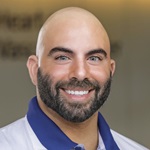New Study Finds Brain Injury Doubles Suicide Risk

Answer a few questions and we'll provide you with a list of primary care providers that best fit your needs.
Traumatic brain injury (TBI) from a car accident, sports injury or other blow to the head can have far more than physical consequences.
A study recently published in the medical journal JAMA finds that those who have suffered TBI have nearly double the risk of suicide, compared to the general population.
Premier Health Now noticed a familiar name in ABC News’ coverage of the study: Fadi Tayim, PhD, director of the Brain Mapping Center at the Clinical Neuroscience Institute. (Premier Health Now previously spoke with Dr. Tayim about the link between multiple concussions and chronic traumatic encephalopathy, a degenerative brain disease.)
“Our identities are deeply rooted in what we do,” Dr. Tayim told ABC News, explaining why people with TBI may be at greater risk of suicide.
“When a brain injury occurs, there is a fundamental disruption in a person’s ability to perform at their best. The longer this disruption persists, the greater the anxiety and pressure build up to 'go back to normal.' When that baseline cannot be achieved, especially in the case of more severe TBIs, there is a higher risk of depression and suicide."
The study, conducted in Denmark, found that the risk of suicide is greater for those with severe traumatic brain injury and those who require numerous medical visits or longer hospital stays.
What can be done to limit the risk for people with TBI?
"By knowing the link between severity of TBI and increased suicidality,” Dr. Tayim says, “clinicians can proactively address multiple problem areas by implementing early interventions. For example, arranging for counseling services in addition to speech, physical and occupational therapies."
Taking advantage of support services, such as those available through the Brain Injury Association, are helpful, he said. “It's important for people to know they are not alone while navigating the recovery process, and proactive counseling may help this transition."
Answer a few questions and we'll provide you with a list of primary care providers that best fit your needs.
Source: Fadi Tayim, PhD, Clinical Neuroscience Institute; ABC News





